-
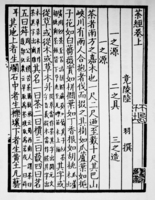 Lu Yu, Image of the First Page of "The Classic of Tea", 760 CE
Lu Yu, Image of the First Page of "The Classic of Tea", 760 CE This is the earliest known account of tea culture and traditions. Lu was raised by Buddhist monks. This is where he acquired his knowledge of tea traditions, cultures, ingredients, and tools. This monograph includes his detailed instructions on how one should prepare and consume tea.
-
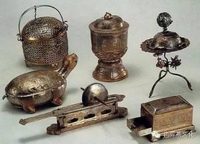 Southeast Asian Ceramic Society, Photograph of Tang Dynasty Royal Tea Set
Southeast Asian Ceramic Society, Photograph of Tang Dynasty Royal Tea Set This is an image of a Tang Dynasty royal teaset. This is the earliest teaset that archaeologists have discovered. This set was found in Famen Temple.
-
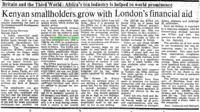 Britain and Africa's Tea Industry
Britain and Africa's Tea Industry Kenya's smallholder tea farmers' production increases as a result of London's financial aid under the Commonwealth Development Corporation fund.
-
 A village in Nandi County, Kenya.
A village in Nandi County, Kenya. The image features a crowded settlement area that was allocated to local Kenyans by British colonialism to pave way for tea plantations.
-
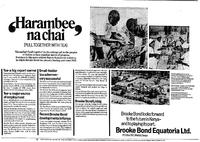 "Harambee na Chai" (Unity with Tea)
"Harambee na Chai" (Unity with Tea) An excerpt of an article detailing accomplishments and progress of Brooke Bond Equatorial Ltd. that appeared in London Times.
-
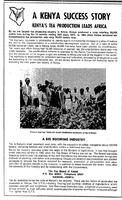 Kenya's Tea Success Story
Kenya's Tea Success Story
-
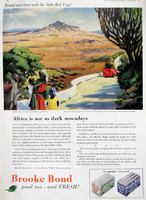 "Africa is not so dark any more"
"Africa is not so dark any more" A painting created by Lulu, a British settler in Kenya in 1950s. Brooke Bond tea company used the painting for its tea advertisements.
-
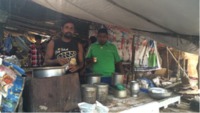 Photograph of a Tea Stall in Ahmedabad, 2016
Photograph of a Tea Stall in Ahmedabad, 2016 The proprietor and his friend in from of a chai stall in the Gulbai Tekra slum in central Ahmedabad, Gujarat, India, 2016.
-
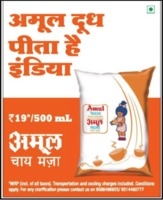 Amul Milk for Tea Advertisement, 2017
Amul Milk for Tea Advertisement, 2017 This is an advertisement for inexpensive milk in a pouch, and shows tea cups, indicating that this milk is perfect for use in daily chai. The company, Amul, is a major dairy cooperative based in Gujarat, India.
-
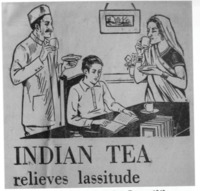 "Indian Tea Relieves Lassitude" Advertisement, 1940s
"Indian Tea Relieves Lassitude" Advertisement, 1940s An advertisement in The Hindustan Times showing a boy and his parents drinking tea, and promoting it for being a safe stimulant.
-
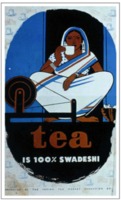 Tea Is 100% Swadeshi Advertisement, 1947
Tea Is 100% Swadeshi Advertisement, 1947 An Indian advertisement promoting tea as "Swadeshi," or 'of the country.' This was part of a greater movement for independence from the British, that encouraged consumption of Indian goods and support of Indian business interests. The spinning wheel relates to Gandhi's campaign for Indian-made cloth and clothes.
 Lu Yu, Image of the First Page of "The Classic of Tea", 760 CE This is the earliest known account of tea culture and traditions. Lu was raised by Buddhist monks. This is where he acquired his knowledge of tea traditions, cultures, ingredients, and tools. This monograph includes his detailed instructions on how one should prepare and consume tea.
Lu Yu, Image of the First Page of "The Classic of Tea", 760 CE This is the earliest known account of tea culture and traditions. Lu was raised by Buddhist monks. This is where he acquired his knowledge of tea traditions, cultures, ingredients, and tools. This monograph includes his detailed instructions on how one should prepare and consume tea. Southeast Asian Ceramic Society, Photograph of Tang Dynasty Royal Tea Set This is an image of a Tang Dynasty royal teaset. This is the earliest teaset that archaeologists have discovered. This set was found in Famen Temple.
Southeast Asian Ceramic Society, Photograph of Tang Dynasty Royal Tea Set This is an image of a Tang Dynasty royal teaset. This is the earliest teaset that archaeologists have discovered. This set was found in Famen Temple. Britain and Africa's Tea Industry Kenya's smallholder tea farmers' production increases as a result of London's financial aid under the Commonwealth Development Corporation fund.
Britain and Africa's Tea Industry Kenya's smallholder tea farmers' production increases as a result of London's financial aid under the Commonwealth Development Corporation fund. A village in Nandi County, Kenya. The image features a crowded settlement area that was allocated to local Kenyans by British colonialism to pave way for tea plantations.
A village in Nandi County, Kenya. The image features a crowded settlement area that was allocated to local Kenyans by British colonialism to pave way for tea plantations. "Harambee na Chai" (Unity with Tea) An excerpt of an article detailing accomplishments and progress of Brooke Bond Equatorial Ltd. that appeared in London Times.
"Harambee na Chai" (Unity with Tea) An excerpt of an article detailing accomplishments and progress of Brooke Bond Equatorial Ltd. that appeared in London Times. Kenya's Tea Success Story
Kenya's Tea Success Story  "Africa is not so dark any more" A painting created by Lulu, a British settler in Kenya in 1950s. Brooke Bond tea company used the painting for its tea advertisements.
"Africa is not so dark any more" A painting created by Lulu, a British settler in Kenya in 1950s. Brooke Bond tea company used the painting for its tea advertisements. Photograph of a Tea Stall in Ahmedabad, 2016 The proprietor and his friend in from of a chai stall in the Gulbai Tekra slum in central Ahmedabad, Gujarat, India, 2016.
Photograph of a Tea Stall in Ahmedabad, 2016 The proprietor and his friend in from of a chai stall in the Gulbai Tekra slum in central Ahmedabad, Gujarat, India, 2016. Amul Milk for Tea Advertisement, 2017 This is an advertisement for inexpensive milk in a pouch, and shows tea cups, indicating that this milk is perfect for use in daily chai. The company, Amul, is a major dairy cooperative based in Gujarat, India.
Amul Milk for Tea Advertisement, 2017 This is an advertisement for inexpensive milk in a pouch, and shows tea cups, indicating that this milk is perfect for use in daily chai. The company, Amul, is a major dairy cooperative based in Gujarat, India. "Indian Tea Relieves Lassitude" Advertisement, 1940s An advertisement in The Hindustan Times showing a boy and his parents drinking tea, and promoting it for being a safe stimulant.
"Indian Tea Relieves Lassitude" Advertisement, 1940s An advertisement in The Hindustan Times showing a boy and his parents drinking tea, and promoting it for being a safe stimulant. Tea Is 100% Swadeshi Advertisement, 1947 An Indian advertisement promoting tea as "Swadeshi," or 'of the country.' This was part of a greater movement for independence from the British, that encouraged consumption of Indian goods and support of Indian business interests. The spinning wheel relates to Gandhi's campaign for Indian-made cloth and clothes.
Tea Is 100% Swadeshi Advertisement, 1947 An Indian advertisement promoting tea as "Swadeshi," or 'of the country.' This was part of a greater movement for independence from the British, that encouraged consumption of Indian goods and support of Indian business interests. The spinning wheel relates to Gandhi's campaign for Indian-made cloth and clothes.